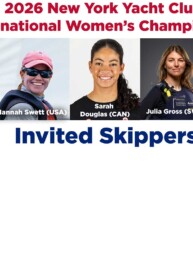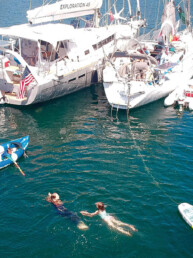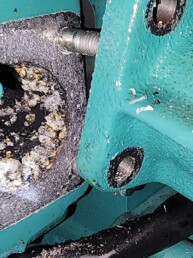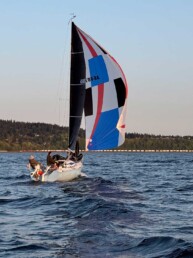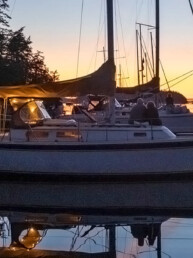As a kid, I loved our family’s banana-yellow speedboat. It was the most typical fiberglass outboard boat you could buy in those days, but it was my ticket to fishing, knee-boarding, camping, and just zooming around. I remember only the fun parts of boat ownership, never the ones my dad had to deal with: maintaining the smelly engine, greasing bearings, or paying insurance.
When it came to boats of my own, an engine was the last thing that I wanted. My youngest son, Merry, on the other hand, still wishes I had bought a boat more like the one that originally got me hooked on a life near the water. Now 16, he comes on an annual sail and oar camp-out, but otherwise deems my choice of craft not only too slow, but downright boring.
Besides being a bit of an adrenaline junkie, Merry is also an extrovert. But since the outset of the Coronavirus, he’s been stuck at home with just his family—three borderline introverts—and rarely gets to see his friends. That’s made him just crazy enough to want to do things with the rest of us.
On a recent weekend, I sat poring over my charts of the Willamette and Columbia Rivers, searching for someplace within half an hour’s drive that I haven’t yet explored. After more than a dozen years boating around here, my quest seemed unlikely; but I needed to get out, and I wanted the stimulation of something new, much like Merry.
I traced my finger up the Willamette, past the industrial zone, beyond downtown, through the suburbs, and to the confluence of the Clackamas River, where it paused. I’d last been near this spot some five years ago, when I was unceremoniously washed downstream, unable to beat the combined power of the two rivers. Forced to haul my boat out of the water at a neighborhood park, I had to roll it back to my car more than a mile alongside a roaring road. I wasn’t keen to return.
But then I noted something significant: just a few hundred yards from the confluence was another boat ramp, and from there, it was only half a mile to Willamette Falls. The largest waterfall, by volume, in the United States, a place of historic value to native peoples, and an early industrial site, the Falls were well worth a visit—and I had never been there by boat.
“Hey Merry, come rowing in Terrapin with me,” I ventured. He’d been jonesing for “something to do” all morning, so I figured he’d probably consent.
“Uh, sure,” he replied. “Where we going?”
“To the Falls!”
A few months earlier, Merry had seen the Falls from the land lubber’s viewpoint, atop a basalt cliff. I’d watched his eyes darting back and forth between the whitewater cascading down a rocky, horseshoe-shaped bowl, the jumbled array of decrepit industrial buildings, and a group of paddle boarders slowly making their way towards the base of the Falls. Although they were riding in an eddy when we arrived, with currents going in multiple directions and bouncing off rocks, it didn’t look easy. Like a sports announcer, Merry had narrated with gusto their attempts at navigating the current.
Soon we were in our own boat, approaching that same eddy. Merry was at the oars, feeling the first real twitching of the current and struggling to keep Terrapin moving in a straight line. After a bit, he asked me to take over the oars. I wondered if he’d experienced enough excitement already, but soon sensed that he was actually having fun taking in the awesome natural power around us. The coursing water, combined with the post-industrial landscape of abandoned buildings above, made for a striking scene that we were both relishing.

A hulking set of slimy wooden locks lurked on the north side of the river. Ahead of us, cascades of water seemed to steam as they poured over stacks of basalt; and a series of old mill buildings teetered on the cliffs. I paused periodically to let Merry clamber onto a rock or talk to a fisherman hauling in a sturgeon.
On one such stop, he scaled some boulders, then climbed higher, onto a concrete pad. I looked up to see him well above me. My parental danger alarm started going off, but when I saw the expression of joy and triumph on his face, I held back from saying anything.
“Hey, Papa,” he yelled, “there’s some huge eggs up here. What do you think they’re from?”
While I pondered that, he picked one up. It being late October, the egg was clearly abandoned, the geese that likely laid it long gone.
Just as I was about to launch into an ornithological explanation, I heard Merry’s voice again. “I’m going to throw it!”
Before I could stop him, he tossed the egg high into the air. It arced as if it contained a boat tracker and seem to be headed right toward me. Everything moved in slow motion. As the egg reached its apex, I realized that, given its likely age, it was surely rotten. My dismay barely had time to register before the egg thwacked into the water, part of it sinking beneath the surface, while the rest exploded, scattering horizontally for a shocking distance. The next instant, the submerged portion shot back up again, like a noxious mushroom cloud, spraying a white-flecked aerosol of sulfurous goo.
The emerald side of the boat was splattered, and I was covered head to toe in what remained. It took about 30 seconds for the full aroma to emerge, and I momentarily gagged before I had the sense to move away from the epicenter.
By that time I regained my composure and stripped off my rancid shirt, Merry was laughing maniacally. Soon I was, too.
When he stopped chortling, he apologized. “I didn’t mean to send that your way, it just sort of happened.”
“That’s okay,” I replied. “Sometimes fun stinks.”
Bruce Bateau
Bruce Bateau sails and rows traditional boats with a modern twist in Portland, Ore. His stories and adventures can be found at www.terrapintales.wordpress.com

